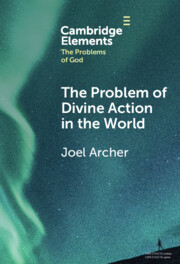Element contents
The Problem of Divine Action in the World
Published online by Cambridge University Press: 08 December 2023
Summary
- Type
- Element
- Information
- Series: Elements in the Problems of GodOnline ISBN: 9781009270328Publisher: Cambridge University PressPrint publication: 01 February 2024
References
- 2
- Cited by



